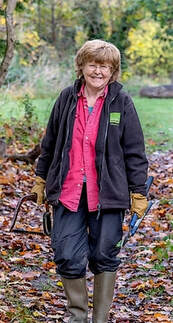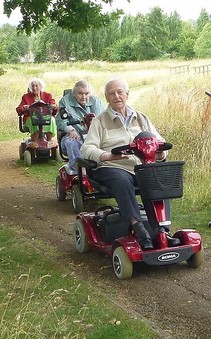The tab headings above - not just the drop-down menus - are links to pages
Please note children and dogs should NOT be allowed to go into the ponds - see the reasons for this.
Judy's 2023 newsletter, circulated 8 Jan 2024
2022 newsletter, circulated 1 Jan 2023
Please note children and dogs should NOT be allowed to go into the ponds - see the reasons for this.
Judy's 2023 newsletter, circulated 8 Jan 2024
2022 newsletter, circulated 1 Jan 2023
|
Dr Marion Anscombe (married name Dorrington), sadly passed away on 2 May 2024.
This is from Dr Judy Webb, who organises volunteering in the Park: 'Marion was a regular conservation volunteer at Milham Ford Nature Park for some years on Sunday mornings. She was great at wielding a pair of loppers when needed in our scrub work and enjoyed all the seed-sowing. She was an important member of the team that made the site so abundant in beautiful flowers as it is now. She visited us working in the park one Sunday to tell us of her advancing condition and I was amazed at her stoicism and positive attitude'. Marion's funeral, a humanist ceremony, was held in the church hall of Marston United Reformed Church on 25 May. She had asked for donations to be sent to the Motor Neurone Association charity, who greatly supported her and her husband, Keith, over her last two years. Donations can be made via this tribute website, where photos of Marion can be seen in the Galleries. |
 Photo by Tony Gillie Photo by Tony Gillie
Dr Judy Webb BEM, founder member of the original New Marston Wildlife Group, seen here in Rock Edge Nature Reserve, Headington, is the Coordinator of the volunteers group of Friends of Milham Ford Nature Park. She was awarded her BEM in the 2021 New Year's Honours List and was also included in the BBC's Woman's Hour 2020 Power List: Our Planet. More information here
Judy has her own website. |
Please do not bring any species to add to the park. A well-intended 'gift' (including plants) could be damaging for its ecology. See Moving frogspawn or frogs between ponds may aid the spread of ranavirus, which is one of the most serious health threats currently facing the UK's amphibian population" Protect our ponds (this includes a link to a list of the aquatic creatures they support) |
We are always delighted to welcome new volunteers to help maintain the park. There is no requirement to pay a subscription to join the group and you don't have to commit to helping regularly. You can come along to events for an hour or so, when convenient for you, choosing tasks that suit you best, from litter-picking to more strenuous ones, such as digging-out unwanted vegetation.

If you'd like to join us or get further information about what we do, we'd be pleased to meet you at one of our Future Events or you can contact us via the address given here:
Please note: it might take a few days for you to get a reply
Please note: it might take a few days for you to get a reply
The park is on Marston Road, Oxford, between Jack Straw's Lane (St Michael and All Angels Church corner) and Harberton Mead. On Sundays there is some parking available in Harberton Mead, as well as the possibility of a space at the bottom of Jack Straw's Lane. Please do not use the church car park at any time, as the spaces there are needed not only for church visitors but for people, particularly those with mobility problems, attending social groups or keep-fit classes at the adjacent pastoral centre.
Buses: CityX3 all through year. 100 Brookes U5 only during semester (not vacation)
When travelling towards the John Radcliffe Hospital get off at the Ferry Road stop (Up in Arms pub) - the nearest access to the park is on Harberton Mead. When travelling towards St Clements it's the Jack Straw's Lane stop - nearest access point Marston Road entrance.
Buses: CityX3 all through year. 100 Brookes U5 only during semester (not vacation)
When travelling towards the John Radcliffe Hospital get off at the Ferry Road stop (Up in Arms pub) - the nearest access to the park is on Harberton Mead. When travelling towards St Clements it's the Jack Straw's Lane stop - nearest access point Marston Road entrance.
History of the Park
Judy has written a short history of Milham Ford School, which used to occupy buildings adjacent to the park. They are now owned by Oxford Brookes University and used by the Centre for Nursing, Midwifery, Health and Social Care. Among the photos Judy has included is one taken in 1996 showing pupils creating a second, clay-puddled, pond in the marshy area beside the tennis courts (Harberton Mead side). That pond can still be found today, after a lot of weat weather, as can the site of the first one, on the Jack Straw's Lane side near the corner with Marston Road
The change from New Marston Wildlife Group to Friends of Milham Ford Nature Park
Judy has written a short history of Milham Ford School, which used to occupy buildings adjacent to the park. They are now owned by Oxford Brookes University and used by the Centre for Nursing, Midwifery, Health and Social Care. Among the photos Judy has included is one taken in 1996 showing pupils creating a second, clay-puddled, pond in the marshy area beside the tennis courts (Harberton Mead side). That pond can still be found today, after a lot of weat weather, as can the site of the first one, on the Jack Straw's Lane side near the corner with Marston Road
The change from New Marston Wildlife Group to Friends of Milham Ford Nature Park
|
Ducks:
If you see any ducks while you are in the Park, please DO NOT feed them. They eat the pond life that we have been trying hard to encourage by pond management and introducing beneficial aquatic plants. They also stir up mud, which coats the plants, blocking out the sunshine they need to survive. On feeding ducks, see also BBC Newsround article, 14 March 2016 and BBC video 14 March 2016 |
Dogs:
To prevent health risks and to preserve the flowers and fungi, please keep your dog on a lead so you can keep track of any 'deposits' and bag-and-bin them. (There are red bins for dog excrement.) Dog excrement adds nutrients to the soil making conditions more favourable for grass, which could then smother and kill off the wildflowers and the fungi. Roundworm eggs in dogs' faeces can survive for up to 5 years in the soil. Ingesting even just small particles of soil contaminated by dog faeces can cause toxocariasis, which can lead to blindness, as in the case of a toddler who fell in dog mess (click here) and a woman who had to have an eye removed 30 years after becoming infected (click here). |

Green Health Route in Marston
The Centre for Sustainable Healthcare (a charity) has produced a map of a local nature walk route, (2.5 miles approx.), which includes Miham Ford Nature Park, after liaising with schoolchildren from St Nicholas, St Michael’s and New Marston Primary Schools, as well as with residents at Marston Court, the care home near to the Park, who are encouraged to use the route, or parts of it, by walking or venturing out on their mobility scooters. Copies of the leaflet showing the route (link above) have been put on the notice boards in the Park. For further information click here
Left: some of the residents of nearby Milham Court visiting the park
For further photos, click here

